Rutgers University: New Jersey’s Social Work Education Powerhouse
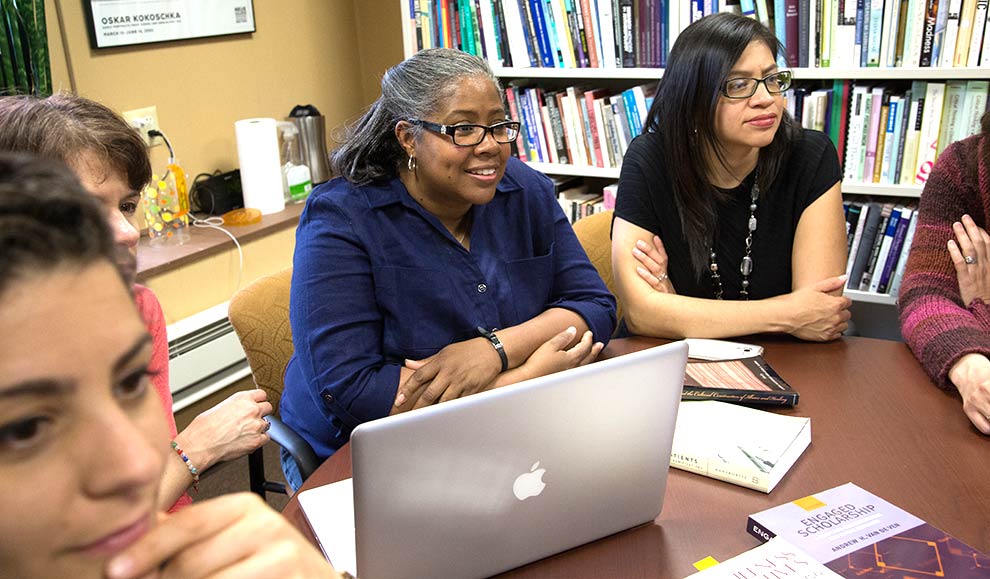
Spread out over three campuses with more than 2,000 students, 75 full-time faculty and 100-plus part-time lecturers, the Rutgers School of Social Work is a gigantic operation featuring everything from a Center for Gambling Studies to two doctoral programs.
To get a handle on all this, it’s key to have a good five-year plan — and a couple of years ago, the school was due for a new one, says Dean and Distinguished Professor Cathryn C. Potter. “One way I think that our new strategic plan stands out is in the robustness of the prework to the planning, where we got an enormous amount of data on the table from faculty, staff, students and leaders to take a look at.”
“Toward a More Just Future” was finalized in October 2020, with several of its initiatives getting off to a fast start. One was “Inclusion, Intersectionality, Diversity, Equity and Advancement (IIDEA).” Longtime Rutgers social work professor Dr. Antoinette Y. Farmer accepted the brand-new position of associate dean for diversity, equity and inclusion (DEI), responsible for running the IIDEA Committee — composed of faculty, staff and students — and advancing IIDEA’s goals.
Solid Plan, Solid Results
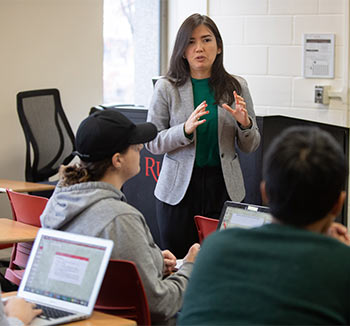
One early accomplishment, Farmer says, was developing an IIDEA annual report, which highlighted goals related to instilling DEI ideals throughout the school and with partner agencies. The committee has also trained doctoral students to run IIDEA-related workshops; developed a website; and implemented the “Liberatory Consciousness” framework, created by UMass professor emeritus Dr. Barbara Love, to help guide curriculum development and other work.
Developing curricula is also a separate initiative of the school’s five-year plan and is well under way. There has been an initial focus on technology and social work practice, and on infusing more leadership content across the whole program, rather than just relying on continuing education to supply it. “Social workers need a healthy dose of macro training, because even though they think they’re going to be clinicians forever, they aren’t,” says Potter. Another possibility: a post-master’s certificate for graduates to get when they find themselves moving into management.
Among other strategic plan initiatives, says Associate Dean for Finance and Administration Sharon A. Fortin, who was a lead architect of the plan, are “Supporting the 21st-Century Student” through financial assistance, technology and career development, as well as dramatically expanding community engagement in research, fieldwork and other areas.
Washington Connections
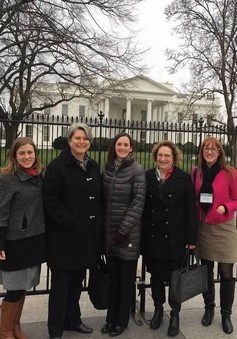
Speaking of research, one longtime star of the Rutgers School of Social Work that resides on the New Brunswick campus (versus Camden or Newark) is the research-focused Center on Violence Against Women and Children. It was launched in 2007 to produce studies that would be immediately useful to practitioners, says associate professor Dr. Sarah McMahon, the center’s director. Among other things, it has created a certificate program for MSW students.
In 2014, McMahon, who has done a lot of research on campus sexual assault, led a “Campus Climate Survey,” part of a multi-university Obama administration initiative that measured the prevalence of campus sexual assault and the variables related to it. “We worked closely with our administration here at Rutgers, as well as our dean and an advisory board that included students, to help pilot the survey and then develop a report, which we submitted to the White House,” she says.
But McMahon is not the only Rutgers social work educator with Washington connections. Marla Blunt-Carter, MSW, assistant professor of professional practice, is from a political family in Delaware (her sister, Lisa Blunt Rochester, a Democrat, is currently the state’s U.S. representative) and was on Joe Biden’s Senate staff as director of constituent services, which included social work outreach. One of Blunt-Carter’s goals has always been to “elevate our profession, the visibility of our profession, for individuals and society to have a better understanding of all of the things that we do and all of the ways that we can perform in creating social change.”
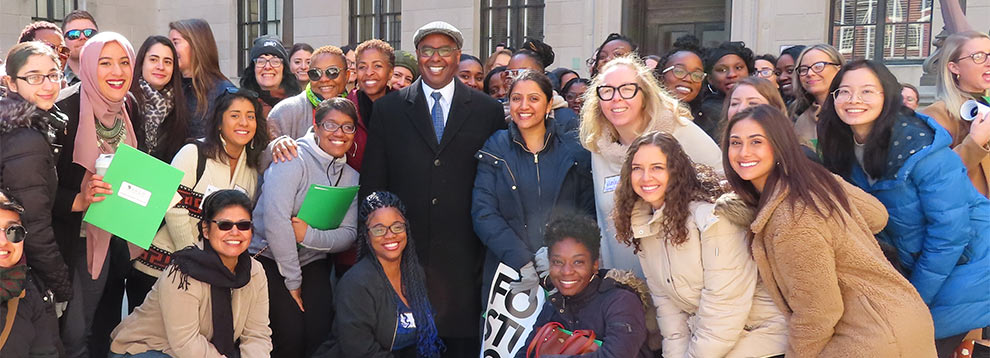
NASW-New Jersey’s Legislative Education & Advocacy Day, 2020: Social work students, educators and practitioners rally at the state-house in Trenton, calling on lawmakers to re-fund the Social Services Student Loan Redemption Program
When her former boss was elected president, Blunt-Carter saw her chance. Working with NASW President Mildred “Mit” Joyner and CEO Angelo McClain as well as White House contacts like Office of Public Engagement Director Cedric Richmond, she helped set up an 1,800-person White House briefing via Zoom with the goal of thoroughly explaining social work to top Biden administration officials. The briefing also involved NASW leadership, social work professors and practitioners, and even a Rutgers social work student who focused everyone’s attention on the enormous burden of student debt. Since then, Blunt-Carter has been putting together a course on political social work, probably debuting next year and definitely a priority for Dean Potter.
Ohio State University: Researching Ways to Make Older Adults’ Lives Easier and More Enriching
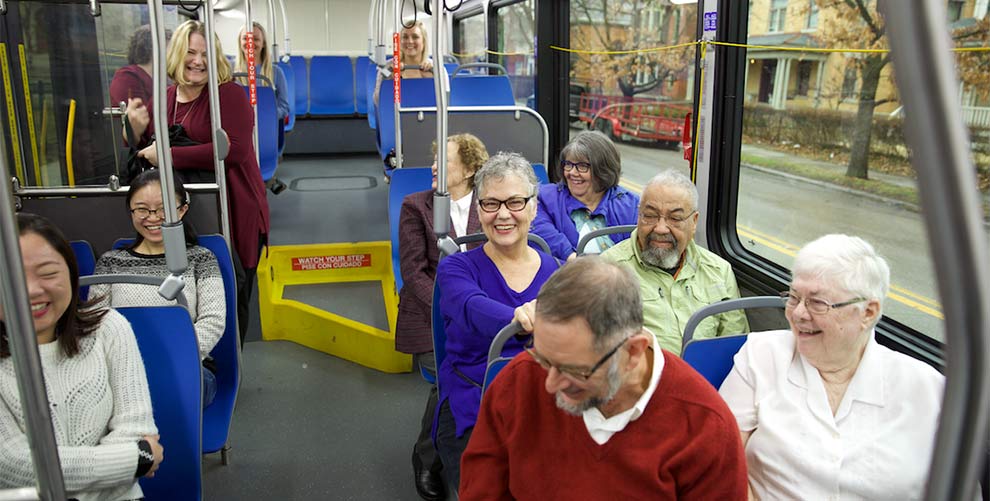
Columbus, Ohio, residents of all ages and abilities join OSU students and Age-Friendly staffers during a positive aging project involving the Central Ohio Transit Authority
The Ohio State University (OSU) College of Social Work recently launched its Age-Friendly Innovation Center (AFIC). It evolved from the city of Columbus’ participation, since 2016, in the World Health Organization and AARP’s international Age-Friendly Communities initiative, which has always involved OSU’s social work program as well, says the center’s director, Katie M. White, MSW.
Unlike a lot of university centers, AFIC focuses on both research and pilot projects, while emphasizing education, community engagement and interdisciplinary student involvement, White says. OSU’s Age-Friendly program, adds associate professor and AFIC Director of Research Holly Dabelko-Schoeny, has produced such research studies as one — in partnership with the Ohio Department of Transportation — on mobility patterns for older adults and people with disabilities, as well as reports on issues like employment and volunteer opportunities, and effectiveness of social services.
As part of the program’s evolution toward a more formal structure, AFIC is establishing the “Age-Friendly Innovation Center Scholar,” says Marisa Sheldon, MSW, LISW-S, director of interdisciplinary engagement. “The students with us will now go through a designed curriculum together as they experience the interdisciplinary connection with their peers and exposure to older adults.” Being an Age-Friendly Scholar will also help students build their professional network in Columbus since AFIC works with so many agencies there, says White. Regardless of whether the student’s discipline is social work, occupational therapy, psychology, or urban and regional planning, “we’re going to make sure that we link them up with individuals in the community that they should be meeting, not only in terms of older adults but also in terms of professional contacts for their career.”
Rhode Island College: Combined BSW-MSW Program Helps Students of Color
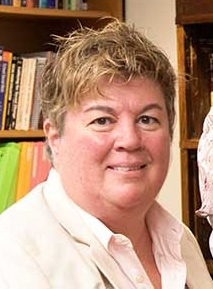
Dr. Jennifer Meade, associate professor and chair of the MSW program, talks about the accelerated BSW-MSW track and what her program has learned from the pandemic.
How would you distinguish your social work education program from others?
One unusual feature is that we have an accelerated BSW-MSW program whereby students graduate with a BSW and then go right into our MSW program. It’s particularly beneficial to students of color, who may not have imagined that an MSW or graduate degree was even possible, and we’re able to mentor them and support them early on so that once they come into their master’s program they’re more than ready to complete the MSW. We have just had our first graduating class of 18 students and accepted the most recent cohort of 34.
How does the consolidated program help students bridge the gap between the two degrees?
We have a foundational MSW generalist course that students take as BSW seniors over two semesters — one class in the fall and one in the spring. It was carefully designed so it can really help them make that transition, and they’re also integrated in the classroom with MSW students, so they’re not on their own.
What lessons have been learned from dealing with the pandemic?
Switching to online teaching got us to think about how we offer courses, and we will probably modify and think through how we do that, maybe providing more of a hybrid model where we have additional online options. The dean, myself and others have also had initial discussions around our curricula — such as focusing more on antiracism work, decentering whiteness throughout the curricula.